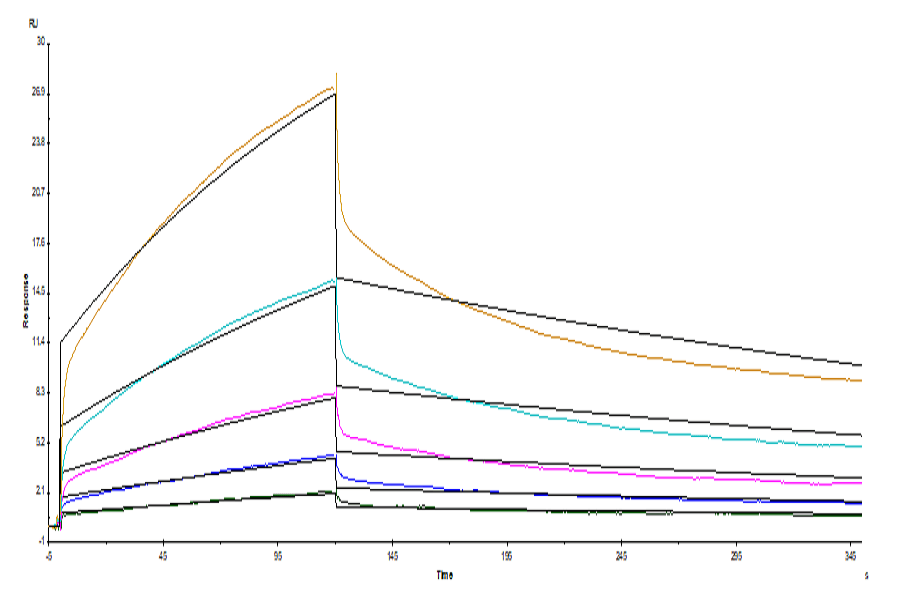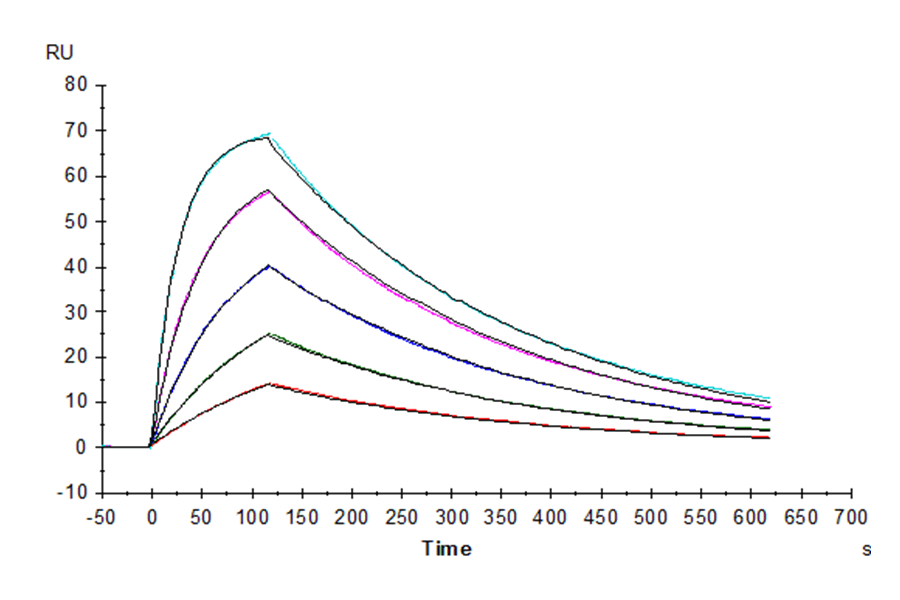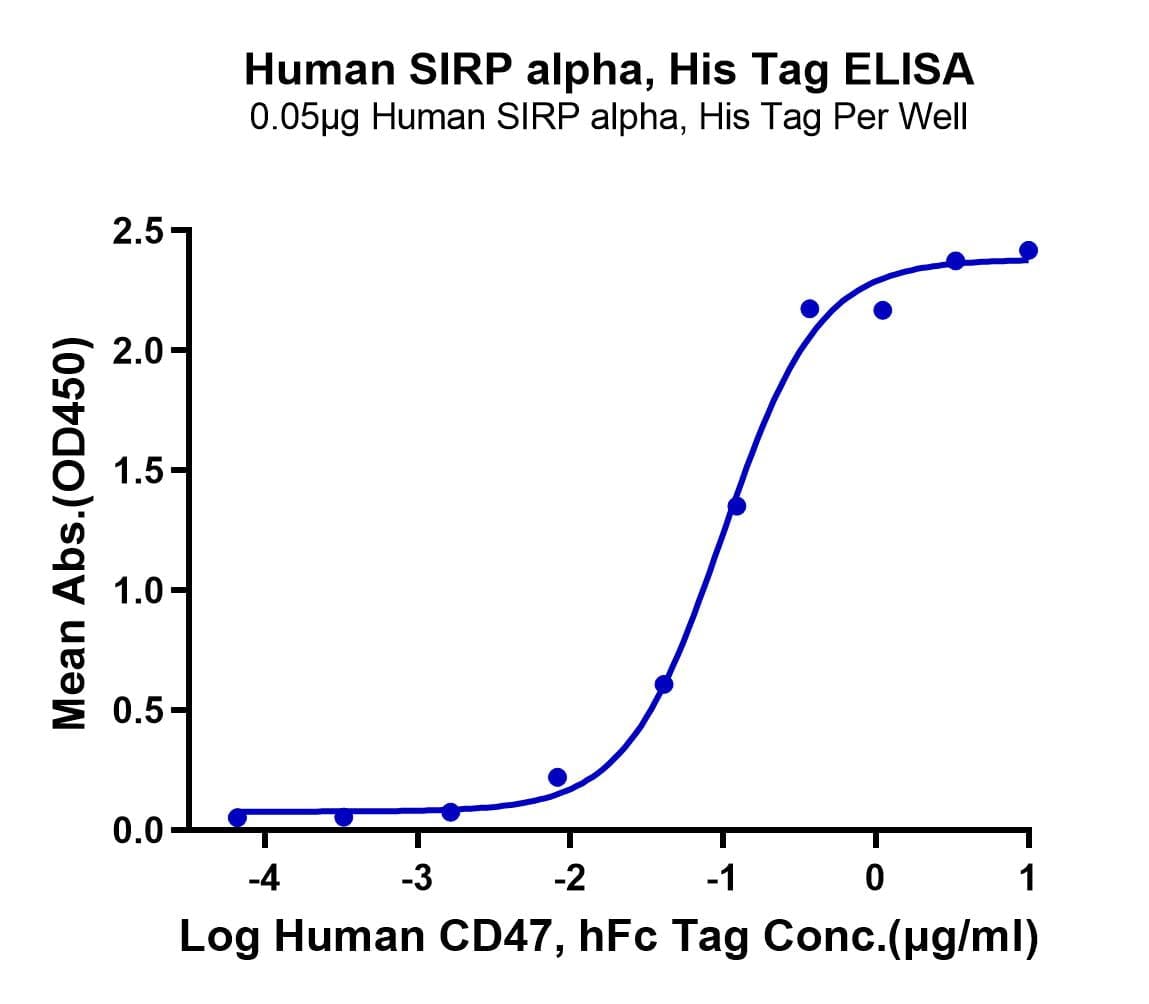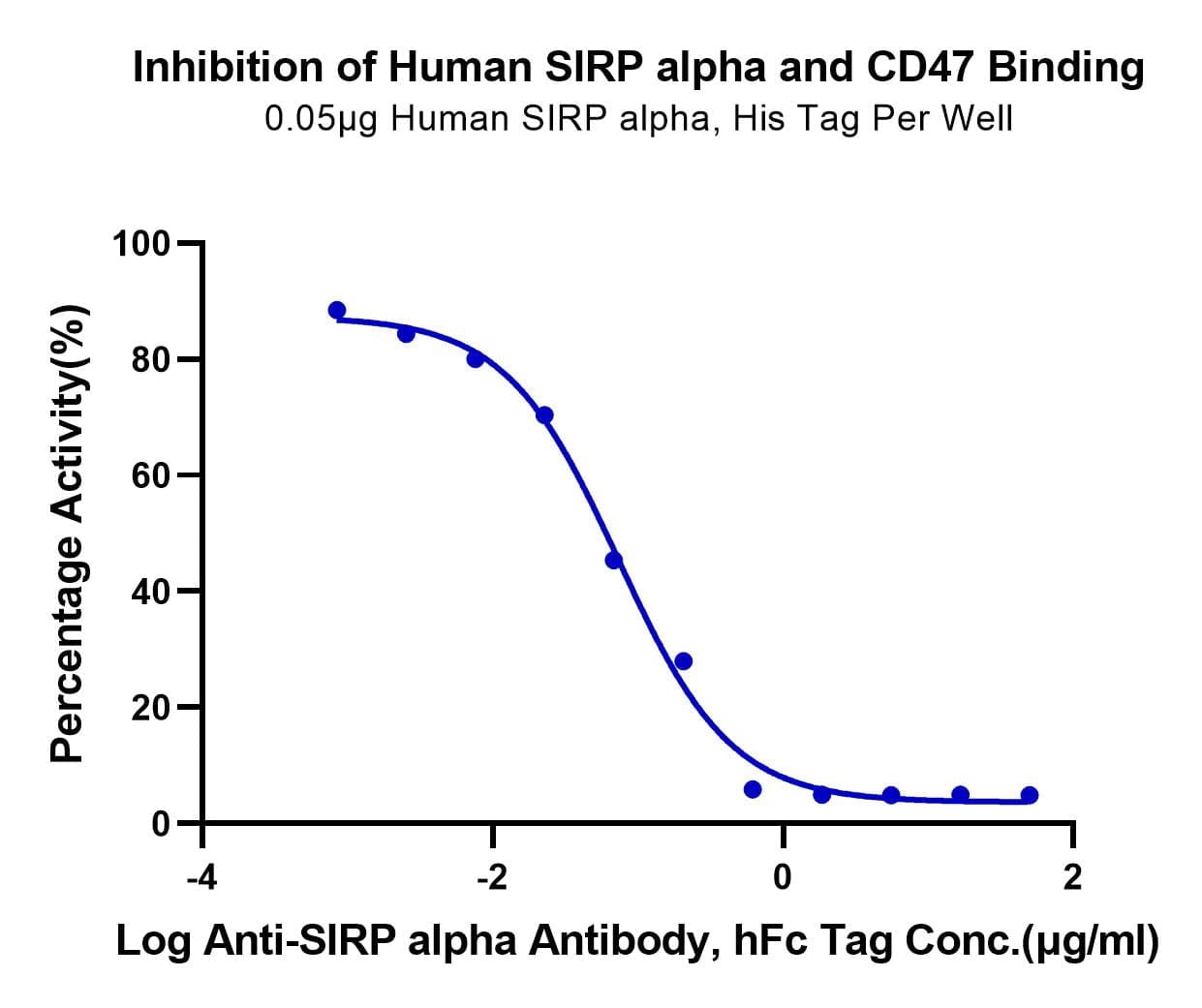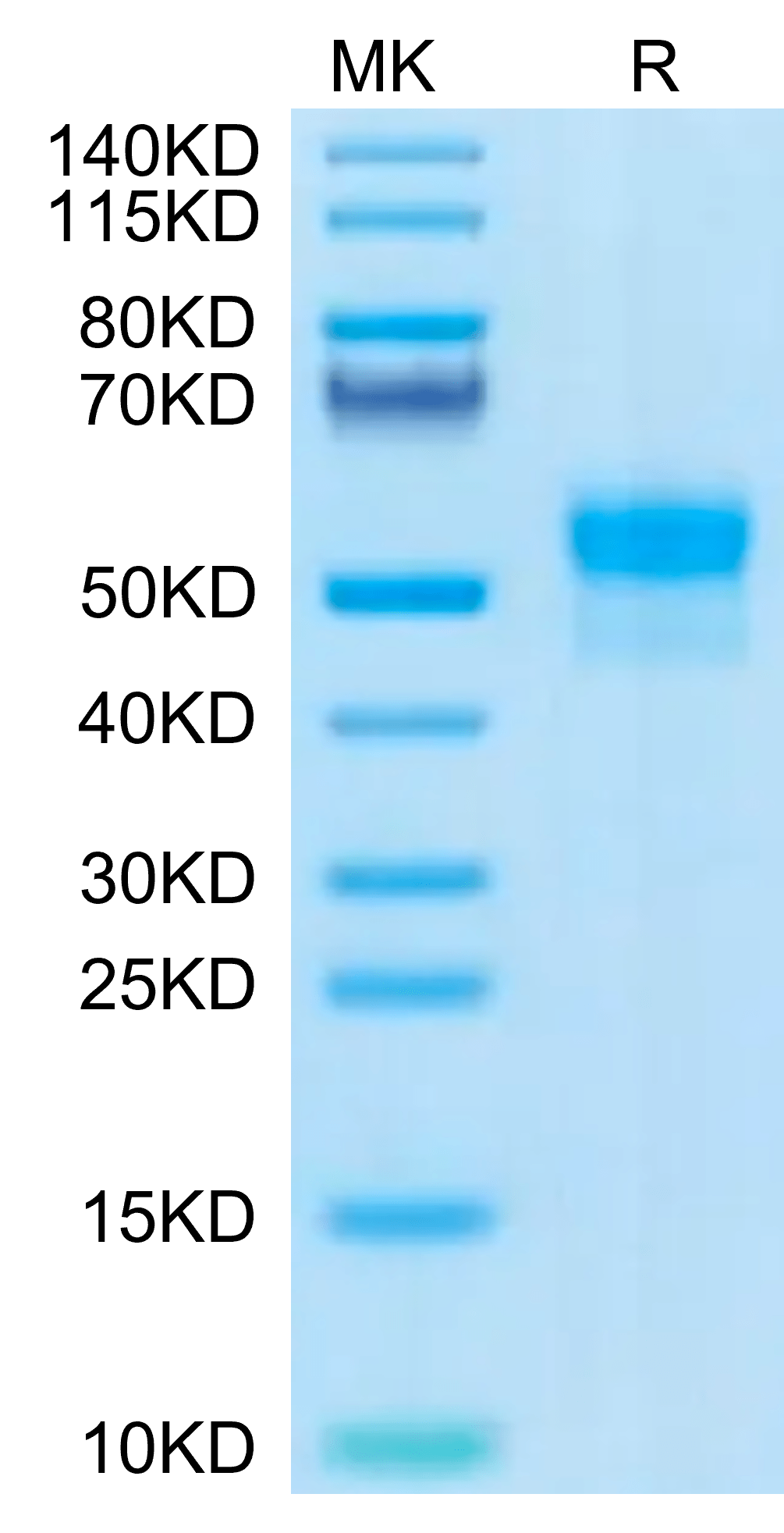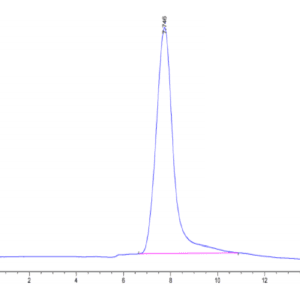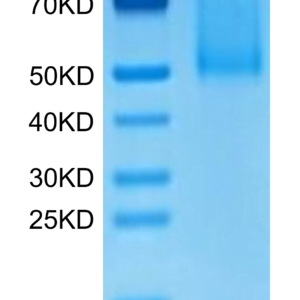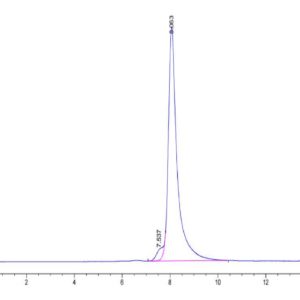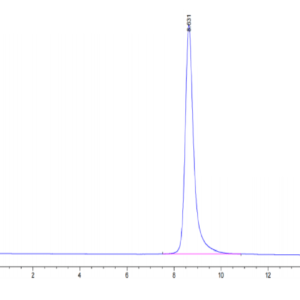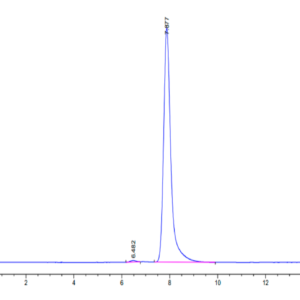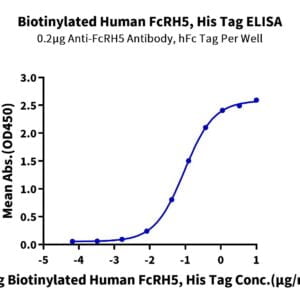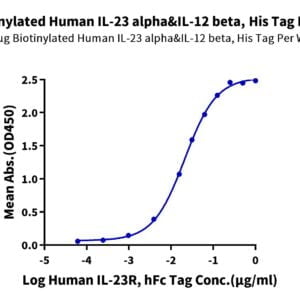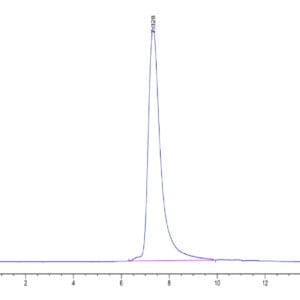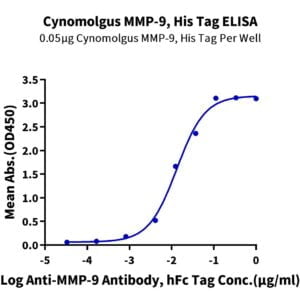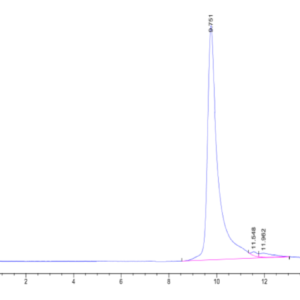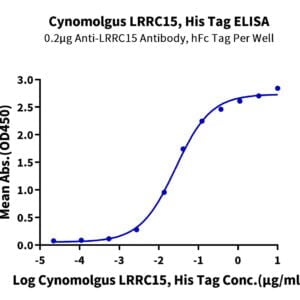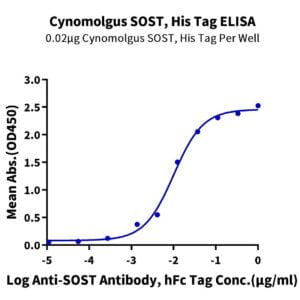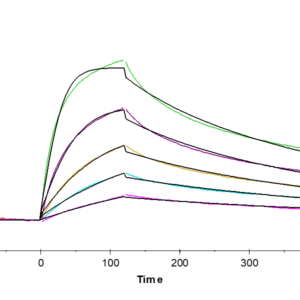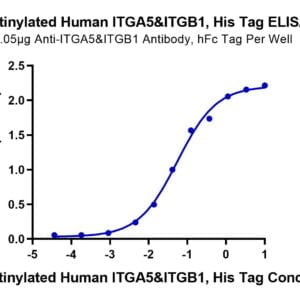| Weight | 1 lbs |
|---|---|
| Dimensions | 9 × 5 × 2 in |
| accession | P78324 |
| express system | HEK293 |
| product tag | C-His |
| purity | > 95% as determined by Tris-Bis PAGE;> 95% as determined by HPLC |
| background | Signal regulatory protein α (SIRPα) is a regulatory membrane glycoprotein from SIRP family expressed mainly by myeloid cells and also by stem cells or neurons.SIRPα acts as inhibitory receptor and interacts with a broadly expressed transmembrane protein CD47 also called the "don´t eat me" signal.Cancer cells highly expressed CD47 that activate SIRP α and inhibit macrophage-mediated destruction. |
| molecular weight | The protein has a predicted MW of 38.1 kDa. Due to glycosylation, the protein migrates to 50-65 kDa based on Tris-Bis PAGE result. |
| available size | 100 µg, 500 µg |
| endotoxin | Less than 1EU per μg by the LAL method. |
Human SIRP alpha/CD172a Protein 5184
$270.00 – $900.00
Summary
- Expression: HEK293
- Functional: Yes (binding assay)
- Amino Acid Range: Glu31-Arg370
Human SIRP alpha/CD172a Protein 5184
| protein |
|---|
| Size and concentration 100, 500µg and lyophilized |
| Form Lyophilized |
| Storage Instructions Valid for 12 months from date of receipt when stored at -80°C. Recommend to aliquot the protein into smaller quantities for optimal storage. Please minimize freeze-thaw cycles. |
| Storage buffer Shipped at ambient temperature. |
| Purity > 95% as determined by Tris-Bis PAGE |
| target relevance |
|---|
| Signal regulatory protein α (SIRPα) is a regulatory membrane glycoprotein from SIRP family expressed mainly by myeloid cells and also by stem cells or neurons.SIRPα acts as inhibitory receptor and interacts with a broadly expressed transmembrane protein CD47 also called the "don´t eat me" signal.Cancer cells highly expressed CD47 that activate SIRP α and inhibit macrophage-mediated destruction. |
| Protein names Tyrosine-protein phosphatase non-receptor type substrate 1 (SHP substrate 1) (SHPS-1) (Brain Ig-like molecule with tyrosine-based activation motifs) (Bit) (CD172 antigen-like family member A) (Inhibitory receptor SHPS-1) (Macrophage fusion receptor) (MyD-1 antigen) (Signal-regulatory protein alpha-1) (Sirp-alpha-1) (Signal-regulatory prot |
| Mass 54967Da |
| Function Immunoglobulin-like cell surface receptor for CD47. Acts as docking protein and induces translocation of PTPN6, PTPN11 and other binding partners from the cytosol to the plasma membrane. Supports adhesion of cerebellar neurons, neurite outgrowth and glial cell attachment. May play a key role in intracellular signaling during synaptogenesis and in synaptic function (By similarity). Involved in the negative regulation of receptor tyrosine kinase-coupled cellular responses induced by cell adhesion, growth factors or insulin. Mediates negative regulation of phagocytosis, mast cell activation and dendritic cell activation. CD47 binding prevents maturation of immature dendritic cells and inhibits cytokine production by mature dendritic cells. Plays a role in antiviral immunity and limits new world arenavirus infection by decreasing virus internalization (By similarity). Receptor for THBS1 (PubMed:24511121). Interaction with THBS1 stimulates phosphorylation of SIRPA (By similarity). In response to THBS1, involved in ROS signaling in non-phagocytic cells, stimulating NADPH oxidase-derived ROS production (PubMed:24511121). {ECO:0000250, ECO:0000250|UniProtKB:P97710, ECO:0000269|PubMed:10469599, ECO:0000269|PubMed:11509594, ECO:0000269|PubMed:24511121}. |
| Subellular location Membrane; Single-pass type I membrane protein. |
| Tissues Ubiquitous. Highly expressed in brain. Detected on myeloid cells, but not T-cells. Detected at lower levels in heart, placenta, lung, testis, ovary, colon, liver, small intestine, prostate, spleen, kidney, skeletal muscle and pancreas. |
| Structure Binds PTPN11 when tyrosine-phosphorylated, except in macrophages, where it primarily binds PTPN6. Binds GRB2 in vitro. Binds FGR (By similarity). Binds JAK2 irrespective of its phosphorylation status and forms a stable complex. Binds SCAP1 and/or SCAP2. The resulting complex recruits FYB1. Binds PTK2B. Interacts with TRIM2 (By similarity). {ECO:0000250, ECO:0000269|PubMed:18657508, ECO:0000269|PubMed:24511121}. |
| Post-translational modification N-glycosylated. {ECO:0000269|PubMed:16335952, ECO:0000269|PubMed:19159218, ECO:0000269|PubMed:9062191}.; Phosphorylated on tyrosine residues in response to stimulation with EGF, growth hormone, insulin and PDGF. Dephosphorylated by PTPN11. {ECO:0000269|PubMed:10842184, ECO:0000269|PubMed:9062191}. |
| Target Relevance information above includes information from UniProt accession: P78324 |
| The UniProt Consortium |
Data
Publications
Publications
| pmid | title | authors | citation |
|---|---|---|---|
| We haven't added any publications to our database yet. | |||
Protocols
| relevant to this product |
|---|
Documents
| # | ||
|---|---|---|
| Please enter your product and batch number here to retrieve product datasheet, SDS, and QC information. | ||
